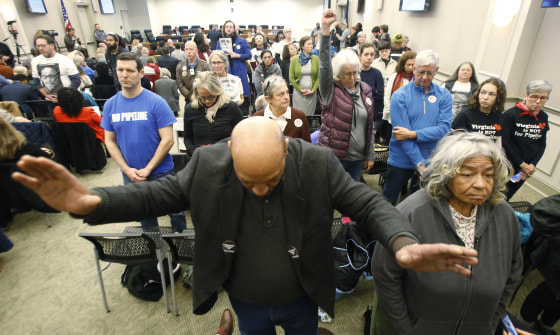Warren County, North Carolina, made national headlines in 1982 when the town of Afton was targeted for a toxic chemical landfill that threatened the health of the community. Afton, which had one of the highest concentrations of African Americans in the state, was among the poorest areas in Warren County. The nation watched as residents, activists and allies ignited a movement, mobilizing to defend one of the most vulnerable communities in North Carolina. Several hundred people were arrested in the fierce outcry that followed; it was one of the largest acts of civil disobedience since the heyday of the civil rights movement of the 1960s.
Nearly four decades since the birth of the environmental justice movement in the 1980s, we face a new Goliath of ecological injustice.
Nearly four decades since the birth of the environmental justice movement in the 1980s, we face a new Goliath of ecological injustice. The Atlantic Coast Pipeline — a project that starts in West Virginia and cuts through Virginia and North Carolina — is poised to threaten poor, rural, black and indigenous communities across those states, forcing us to recognize and respond to the fact that marginalized communities still bear the bulk of our nation's environmental burden.
As we stand with those around the country who are joining with the Poor People's Campaign and organize toward the Mass Poor People's Assembly in Washington, D.C., on June 20, we have borne witness to poor people and communities of color who are burdened with industrial pollution. We see the intersections of poverty, ecological devastation and systemic racism. We cannot address one without being conscious of the other. We continue to encounter communities caught in a vise grip between the Trump administration's efforts to weaken health-based regulations and companies with little regard for the people who live in the shadow of industrial pollution.
If it is built, the 600-mile natural gas pipeline would cut through some of the best preserved forests in Virginia, through rural areas predominantly populated by people of color and low-income households, and end in a predominantly Lumbee Indian community in southern North Carolina. Dominion Energy and Duke Energy — the chief owners of both the project and the utilities that would buy the bulk of the gas for power plants — have not demonstrated that we need this pipeline costing more than $7 billion to meet our energy needs. Nevertheless, their utility customers will be asked to pay for it.
The Atlantic Coast Pipeline would have three compressor stations, poisoning the air in each of the surrounding communities. Compressor stations that use gas-fired turbines emit toxins and fine particle pollution that increase the risk and severity of respiratory illnesses for nearby residents. Unsurprisingly, no posh suburbs or gated communities will have to suffer from this pollution. Instead, these compressor stations were slated for rural areas with above-average rates of poverty and, in North Carolina and Virginia, predominantly African American neighborhoods.
These compressor stations were slated for rural areas with above-average rates of poverty and, in North Carolina and Virginia, predominantly African American neighborhoods.
Family farms are also in the crosshairs, including the black-owned Solomon Farm in Halifax County, North Carolina. Normandy Blackman, named in honor of her father's military service, has been forced to go to federal court to try to stop the pipeline from digging a permanent scar across a forested section of her family's land. Blackman's grandmother Artelia Scott Solomon established the farm, which has been in cultivation for over a century. But the pipeline puts that legacy at risk.
Last year, former Vice President Al Gore and I were invited to Union Hill, one of the proposed sites for the compressor in Buckingham, Virginia. We heard firsthand of the disruption this new source of pollution would cause people who have deep roots in this otherwise quiet, rural neighborhood. We met people whose ancestors founded the community after emancipation, saving money in the years after the Civil War to buy land from the plantations where they had been enslaved, land that they passed down from generation to generation — a noisy, polluting compressor station puts their land and heritage at risk.
As a result of this community's fearless activism, a federal court in January threw out Virginia's air pollution permit — the eighth Atlantic Coast Pipeline permit to be revoked by a federal court or a federal agency. Developers must now recalibrate their plans. But the battle against this insidious pipeline is not over, nor is the fight for environmental justice. The Supreme Court will hear another case challenging the pipeline this month.
The owners of the Atlantic Coast Pipeline are lobbying Congress to push aside longstanding federal laws meant to protect our natural lands. Congress should not bend to their will. After visiting with families threatened by the Buckingham Compressor Station in Virginia, Vice President Gore aptly summarized the pipeline as a "reckless, racist rip-off."
"Racist" because communities of color are expected to bear the brunt of the air pollution from the Virginia and North Carolina compressors. "Reckless" because we cannot responsibly build new fossil fuel infrastructure at a time when the climate crisis requires us to rapidly shift to clean, renewable energy resources. A "rip-off" because captive utility ratepayers will be expected to pick up the tab for this billion-dollar project, which will profit the shareholders of the utility holding companies while driving up power bills for the rest of us.
We have a moral problem in this country when it comes to environmental injustice. Although it is not new, under the current administration, powerful and wealthy corporations are given free rein to despoil and destroy our sacred and treasured lands and threaten the health of our people. Here in the South, we know all too well what that looks like.
Some things are just wrong. In the tradition of the environmental justice movement, we stand with those in the path of the pipeline who are standing up against this scandalous project.


